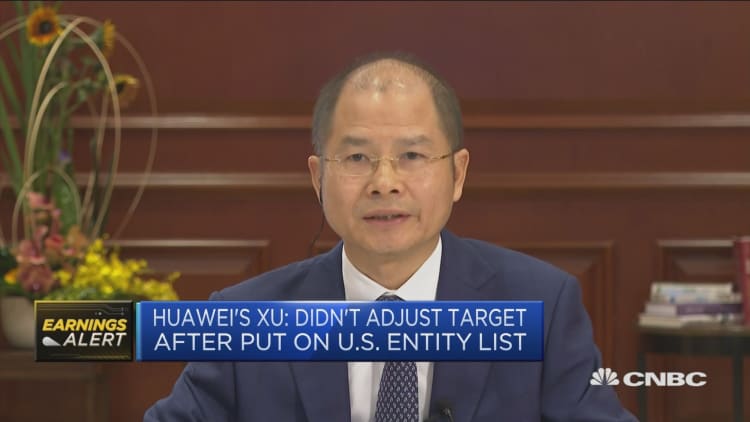
Huawei reported slowing profit growth in 2019 as the U.S. blacklisting the Chinese technology giant weighed on its business.
Meanwhile, a top executive at the company told CNBC the impact from the coronavirus on its business is unclear.
Revenue for last year totaled 858.8 billion yuan ($123 billion), a 19.1% year-on-year rise in yuan terms. Net profit came in at 62.7 billion yuan ($9 billion), marking a 5.65% rise from last year. That's slower than the profit growth of 25% reported in 2018 and 28% in 2017.
Eric Xu, rotating chairman at Huawei, told CNBC in an interview Tuesday that the company had missed its own targets. At the start of 2019, Huawei projected revenue of around 858.8 billion yuan or $123 billion, which it eventually ended the year with. But in April of last year, it was preparing to revise that target to $135 billion.
In May, however, the company was put on the U.S. Entity List, a blacklist that restricts American firms doing business with it. This included companies like Google which was no longer allowed to license its Android mobile operating system to the Chinese company.
Xu blamed the blacklisting for the $12 billion shortfall.
"We didn't meet our revised targets, which was the $135 billion mark. We were short by $12 billion. This was the results of the U.S. sanctions," Xu said Tuesday, according to a CNBC translation of his comments in Mandarin.
"We had to deal with the challenges around the supply continuity and we had to address the supply challenges in the short term, so as to supply certain products to our customers. And we also had to increase our R&D (research and development) investment," Xu added, speaking about why the net profit growth slowed. This was according to a translation provided by Huawei.
Huawei faced a tough year in 2019 as the U.S. continued its campaign to try to get the company blocked from 5G rollout around the world. Next-generation mobile networks known as 5G promise super-fast data speeds and the ability to underpin future technologies like driverless cars.
Washington has maintained that Huawei represents a national security risk arguing that its networking technology could be used by China for espionage. Huawei has repeatedly denied the allegations.
Consumer weakness after Google block
A large part of Huawei's revenue shortfall occurred in the consumer division which accounted for over 54% of the company's total sales in 2019. It overtook Huawei's core networking equipment business to become the biggest division in 2018.
"It is the consumer business of Huawei that was hurt the most," Xu said.
The unit, which includes smartphones and laptops, brought in revenue of 467.3 billion yuan or $66.93 billion in 2019. That was $10 billion less than Huawei was targeting.
"We look at the consumer business, if everything goes on without being disrupted last year, the revenue from the consumer business would at least be $10 billion U.S. dollars more than the numbers we actually achieved," he added.
He attributed this again to the effects of the U.S. blacklisting which meant licensed Google apps couldn't be on its smartphones. That's not a big deal in China where Google services are banned and Chinese consumers have alternatives. But in international markets, Huawei sells its phones with Google's Android operating system which includes apps such as Gmail or Google Maps.
Huawei has now launched two flagship smartphones without licensed Google Android — the Mate 30 last year and P40 earlier this month.
The Chinese technology giant still managed to become the world's second-largest smartphone maker by market share in 2019, overtaking Apple, mainly by doubling down on its efforts in China.
"China contributed to roughly three in five smartphones sold for Huawei globally in 2019 and this is about to rise further in 2020," Neil Shah, research director at Counterpoint Research, told CNBC.
Supply 'fully restored' after coronavirus
The coronavirus outbreak in China earlier in the year forced the country to essentially shut down. It led to businesses remaining closed for a long period of time and factories shut down.
Huawei relies on manufacturing in China for everything from networking equipment to smartphones. But the company says its "production activities" in China are now "fully restored," though it is too early to know the exact impact the coronavirus will have on its business.
"Now we are in a position to evaluate the level of impact from the pandemic on our market performance in China. But at this point in time, in light of the continued spread of the pandemic throughout the world, it's very hard to tell how big the impact on our business might be," Xu said.
When asked if Huawei will be able to meet the demand of its customers, Xu said it should be able to in the "short term," but "if the coronavirus pandemic drags on and cannot be contained globally and some of our suppliers stop production, we are bound to run into difficulties over the long run."


